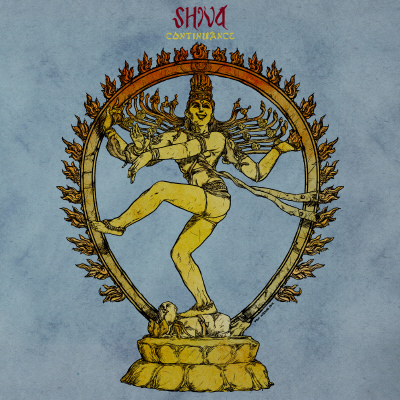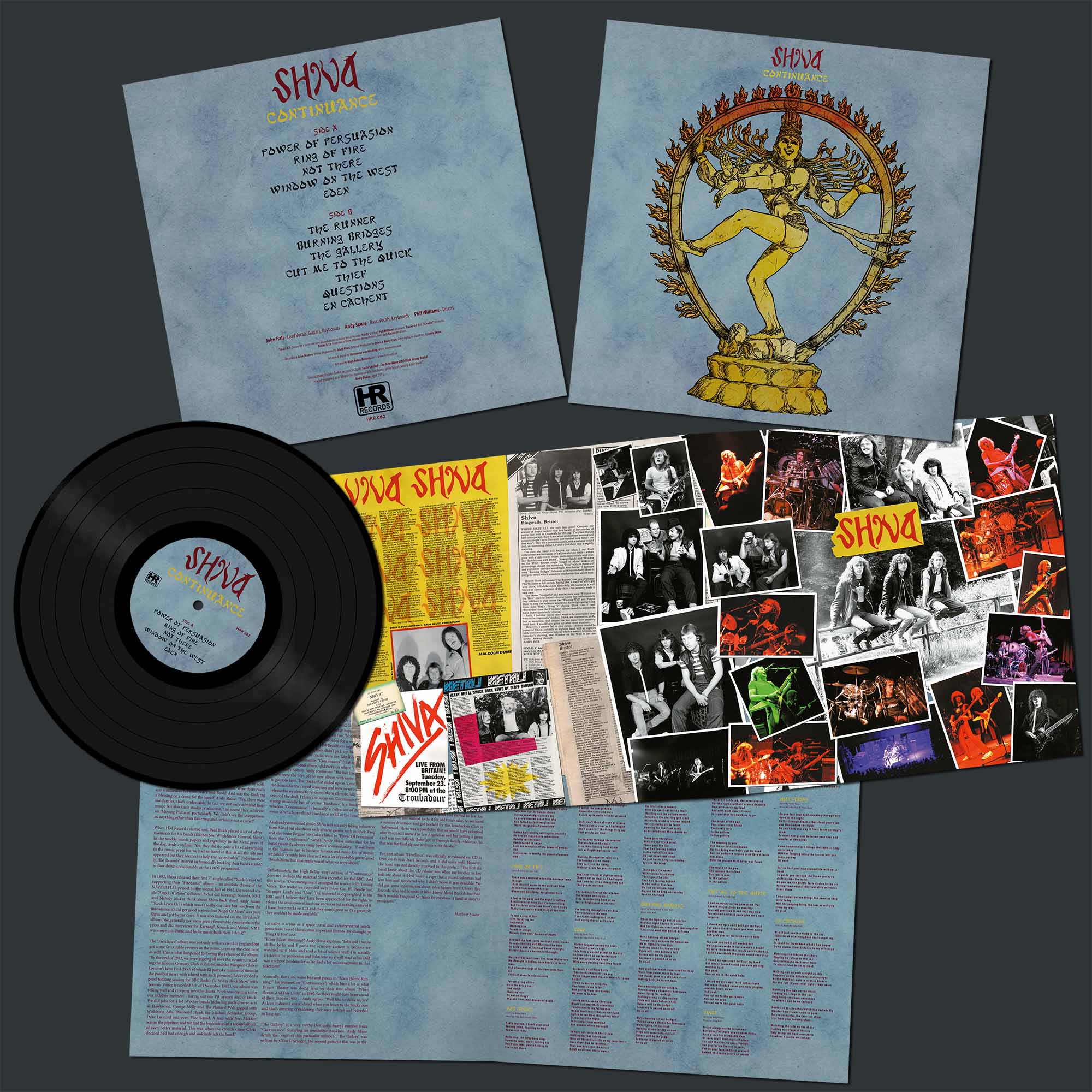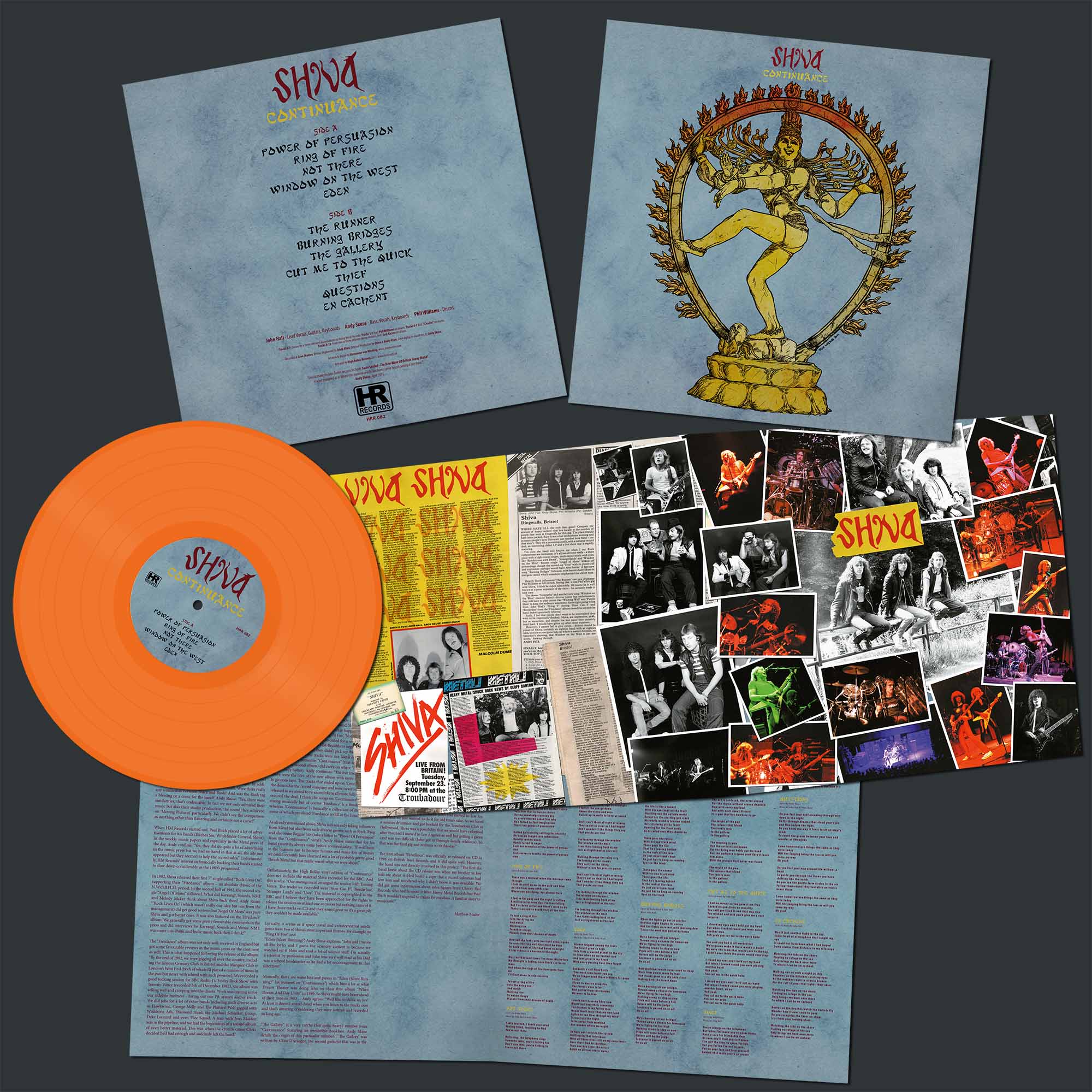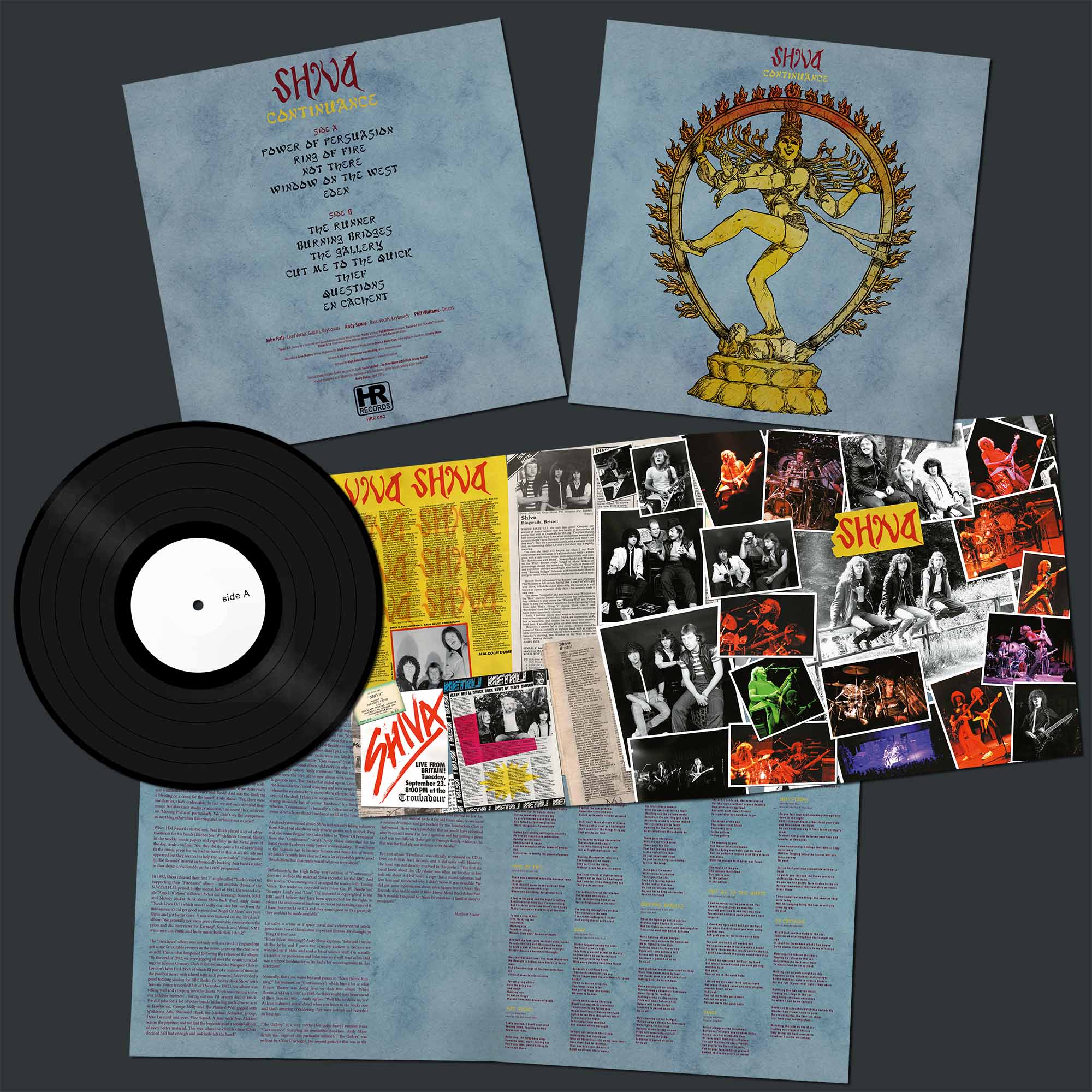 | ||||
| SHIVA - Continuance LP | |
HRR 082, limited to 300 copies, 100 x orange crush vinyl + 200 x black vinyl, 4 page lyric insert | |
| John Hall - Lead Vocals, Guitars, Keyboards Andy Skuse - Bass, Vocals, Keyboards Phil Williams - Drums | |
| -Power Of Persuasion -Ring Of Fire -Not There -Window On The West -Eden -The Runner -Burning Bridges -The Gallery -Cut Me To The Quick -Thief -Questions -En Cachent Tracks 1-7: Demos for a never released second album on Heavy Metal Records Tracks 1-5 feat. Phil Williams on drums Tracks 6-7 feat. “Charlie” on drums Tracks 8-12: From two or three different demo sessions, feat. Jack Carver on drums | |
| SOLD OUT! | |
No doubt about it, Shiva from Bristol was one of the most unusual (and most gifted) bands of the whole New Wave Of British Heavy Metal movement. John Hall (vocals, guitars, keyboards), Andy Skuse (bass, keyboards) and Chris Logan (drums) signed to Paul Birch’s Heavy Metal Records label in 1982. With their strong sense for catchy melodies, high-pitched vocals and progressive song structures, Shiva was the total opposite of out and out Metal acts like Witchfinder General or Jaguar. This did not always work in their favour. Sometimes it was easy to think that the band was sitting between two stools really: Too heavy for the Prog Rock crowd and too progressive/melodic for the metalheads of the day ... Bassist Andy Skuse thinks that this a true observation: “Yes, that was a comment a lot of reviewers made. Which is probably because it was true! We were pretty stubborn about what we liked and didn’t like and we were fans of music like Hendrix and Zeppelin (me), Rush and UFO (John), Asia and Frank Zappa (Chris) and so that was bound to come out in our own songs.” In addition to that, Shiva was often compared to Rush. Were there really any similarities between Shiva and Rush? And was the Rush tag a blessing or a curse for the band? Andy Skuse: “Yes, there were similarities, that’s undeniable. In fact we not only admired their music but also their studio production, the sound they achieved on ‘Moving Pictures’ particularly. We didn’t see the comparison as anything other than flattering and certainly not a curse!”
When HM Records started out, Paul Birch placed a lot of advertisements for his bands (Bitches Sin, Witchfinder General, Shiva) in the weekly music papers and especially in the Metal press of the day. Andy confims: “Yes, they did do quite a lot of advertising in the music press but we had no hand in that at all, the ads just appeared but they seemed to help the record sales.” Unfortunately, HM Records’ interest in financially backing their bands started to slow down considerably as the 1980’s progressed.
In 1982, Shiva released their first 7" single called “Rock Lives On”, supporting their “Firedance” album – an absolute classic of the N.W.O.B.H.M. period. In the second half of 1982, the second single “Angel Of Mons” followed. What did Kerrang!, Sounds, NME and Melody Maker think about Shiva back then? Andy Skuse: “’Rock Lives On’ (which wasn’t really our idea but one from the management) did get good reviews but ‘Angel Of Mons’ was pure Shiva and got better ones. It was also featured on the ‘Firedance’ album. We generally got some pretty favourable comments in the press and did interviews for Kerrang!, Sounds and Venue. NME was more into Punk and Indie music back then I think!”
The “Firedance” album was not only well-received in England but got some favourable reviews in the music press on the continent as well. This is what happened following the release of the album: “By the end of 1982, we were gigging all over the country, including the famous Granary Club in Bristol and the Marquee Club in London’s West End (both of which I’d played a number of times in the past but never with a band with such promise). We recorded a good rocking session for BBC Radio 1’s ‘Friday Rock Show’ with Tommy Vance (recorded 5th of December 1982), the album was selling well and creeping into the charts. Work was coming in for our sideline business - hiring out our PA system and/or truck. We did jobs for a lot of other bands including such diverse acts as Hawkwind, George Melly and The Platters! We’d gigged with Wishbone Ash, Diamond Head, the Michael Schenker Group, Deke Leonard and even Vice Squad. A tour with Iron Maiden was in the pipeline, and we had the beginnings of a second album of even better material. This was when the crunch came: Chris decided he’d had enough and suddenly left the band.”
This is actually the point where the story of the album you are holding in your hand really starts. By early 1983, Shiva had already begun work on their second longplayer, which was never released (up until now). It would have made a killer album but with drummer Chris Logan leaving the band, Shiva had lost their momentum ... Andy Skuse explains what happened: “Five new tracks (‘Power Of Persuasion’, ‘Ring Of Fire’, ‘Not There’, ‘Window On The West’ and ‘Eden’) were recorded for a second album and we confidently took them to HM Records to negotiate a continuation of the contract. But they didn’t pick up the option for the album claiming that the tracks were not Metal enough.” Which is of course utter nonsense, “Continuance” (that was the name of the projected second album) did carry on where “Firedance” had left off (only better). Andy continues: “The five tracks mentioned above were the core of the new album with more songs waiting to go onto tape. The tracks that ended up on ‘Continuance’ were the demos for the record company and were never intended to be released as we aimed to re-record them all more fully once we had secured the deal. I think the songs on ‘Continuance’ are equally strong musically but of course ‘Firedance’ is a finished product whereas ‘Continuance’ is basically a collection of demo tracks, some of which pre-dated ‘Firedance’ to fill in the time.”
As already mentioned above, Shiva was not only taking influences from Metal but also from such diverse genres such as Rock, Prog and also some Reggae bits (take a listen to “Power Of Persuasion” from the “Continuance” vinyl). Andy Skuse states that for his band creativity always came before commerciality: “If we’d been in the business just to become famous and make lots of money we could certainly have churned out a lot of probably pretty good Thrash Metal but that really wasn’t what we were about.”
Unfortunately, the High Roller vinyl edition of “Continuance” does not include the material Shiva recorded for the BBC. And this is why: “Our management arranged the session with Tommy Vance. The tracks we recorded were ‘How Can I?’, ‘Borderline’, ‘Stranger Lands’ and ‘User’. The material is copyrighted to the BBC and I believe they have been approached for the rights to release the session on at least one occasion but nothing came of it. I have those tracks on CD and they sound great so it’s a great pity they couldn’t be made available.”
Lyrically, it seems as if space travel and extraterrestrial intelligence were two of Shiva’s most important themes (for example on “Ring Of Fire” and
“Eden (Silent Running)”. Andy Skuse explains: “John and I wrote all the lyrics and I guess the sciencey content is because we watched sci-fi films and read a lot of science stuff. I’m actually a scientist by profession and John was very well read as his Dad was a school headmaster so he had a lot encouragement in that direction!”
Musically, there are some bits and pieces in “Eden (Silent Running)” (as featured on “Continuance”) which hint a lot at what Dream Theater was doing later on their first album “When Dream And Day Unite” in 1989. So Shiva might have been ahead of their time in 1983 ... Andy agrees: “We’d like to think so, yes! At least it doesn’t sound dated when you listen to the tracks now and that’s amazing considering they were written and recorded so long ago.”
“The Gallery” is a very catchy (but quite heavy) number from “Continuance” featuring an irresistible hookline. Andy Skuse details the origin of this particular number: ”’The Gallery’ was written by Chris D’Aviogne, the second guitarist that was in the original line up in 1979. It was among the first demos we recorded at Cave Studios where we made something like twelve demos. All of those have now been released on disc but I believe ‘Cut Me To The Quick’ was the only one released as a demo tape back then.”
In 1983, Shiva supported MSG in the UK for a couple of dates. For Andy Skuse that’s still a highlight of his career as an active musician: “Playing support to the Michael Schenker Group was a great experience, not least because Michael was a particular hero of John’s. We got on really well even though Michael seemed to have had too much beer most of the time!”
Shiva officially disbanded shortly after the tour with MSG: “The decision by HM Records to dump the contract left us without a record deal and we also split with our management as we thought they weren’t doing enough to promote us to other record companies. We did try and regain the momentum we’d built up with ‘Firedance’ but it was a tough time and we finally split in late 1983.”
However, they played one final gig in 1986, in Los Angeles ... Andy explains: “Yes, that’s correct! John had moved to Los Angeles and we just wanted to do it for old time’s sake. So we hired a session drummer and got booked for the Troubadour Club in Hollywood. There was a possibility that we would have reformed after that had I moved to Los Angeles as well but getting a green card was too difficult (John got in through family relations). So that was the final gig and remains so to this day.”
The first album “Firedance” was officially re-released on CD in 1996 on British Steel Records and it did quite well. However, the band was not directly involved in this project: “The first the band knew about the CD release was when my brother in law told me about it. He’d heard a copy that a record salesman had lent him and wondered why I didn’t know it was available. We did get some information about sales figures from Cherry Red Records who had licensed it from Heavy Metal Records but Paul Birch wouldn’t respond to claims for royalties. A familiar story to musicians!”
Matthias Mader


